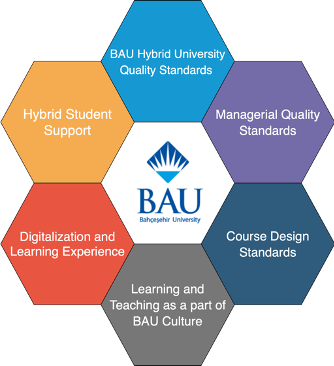The diversity and speed of digitalization, the widespread development of technology in every field, radical changes in the most basic activities that make up daily life reached a whole new level during the pandemic.
The pandemic has created a "new normal" and brought with it some irreversible changes which have given rise in a very short time to needs that vary immensely.
In education, this situation should not be regarded as a temporary change but a transformation, and this transformation should be structured with a strategic perspective and road map.

As an important contributer to this transformation, the BAU family has taken on the mission of furthering innovation and advancement in academics internationally and has prepared a road map to pioneer this change. The focus of this roadmap is determined by the "BAU Hybrid University Quality Management and Standards".
BAU hybrid university quality standards are divided into six categories. The aim of these classifications is to maximize the contributions of partners not only in education but other academic services that have direct and indirect effects on this transformation. Therefore, with this standardization, the minimum quality all administrative and academic units must meet in their services will be measurable. Additionally, this structuring is expected to redesign administrative and academic processes in a way that will be mutually nourishing and bring them together functionally thus reflecting the interdisciplinary approach that has become an integral part of BAU culture.
In terms of management, the definition of Hybrid University should be clearly stated.
In this context, it should be underlined that the university has a new and agile management approach but maintains its traditional hierarchical structure. Our duty in terms of managerial communication is to optimally combine traditional and new approaches in order to create an original model compatible with both our system here at home and abroad.
Hybrid University contributes to students’ academic, psycho-social, professional, physical, ethical and intellectual development by supporting all education-related processes with scientific studies and modern technologies; it enables students to adopt an up-to-date, interdisciplinary approach to learning as they become equipped with 21st century skills. As such, this transformation aims to individualize and improve face to face and online learning in a way that makes them more efficient and exciting. This is to be done by developing and advancing interdisciplinary education, global learning experiences, sectoral research, application and entrepreneurship centres. In short, it should be considered as redesigning learning processes on and off campus (online, global, internship etc.) but it should be acknowledged that face to face education and campus life have not been abandoned .
The BAU hybrid university model, structured with a holistic approach also aims to develop research and development in terms of quantity and quality in accordance with BAU objectives; to review and automate all processes to improve student experience and education quality; to improve social benefits on a local, national and international scale. To achieve all these goals, administrative and academic bodies must work together and be accessible to a hybrid working order; it is also necessary to establish data-based decision making mechanisms that give fast and accurate results.
This approach is not only geared toward alleviating the difficulties encountered during the pandemic but engenders the passion to pioneer a modern and versatile approach to education that is ever evolving to thrive in a globalizing world. To this end, it is imperitive to follow a road map that strengthens learning outcomes by focusing on increasing the quality of education at every step.
This change ensures that individualized academic, physical, psychological, sociological, intellectual, ethical and career-related services are more effectively and productively made available to students. Other objectives of this transition include: facilitating the transfer of learning outcomes to their professional work; the effective use of the rich opportunities offered by the BAUGLOBAL network and thus enhancing intercultural competence; learning, experiencing, and growing with global observations and experiences; Increasing the support from partners for our alumni network and strengthening it internationally.
Considering all these goals and objectives, the hybrid learning experience is designed to enable students to gain experience outside the campus, in the field of research & development, in industry and the international arena. In this context, it is important to encourage the development of programs such as international research & development, sectoral collaborations, Erasmus, World Exchange, BAUGlobal certification and dual-up. All these stated goals are about making the learning experience accessible to students anytime, anywhere with a 21st century approach based on an interdisciplinary perspective of the whole learning experience while also promoting on campus activities.
In summary, a hybrid university approach focuses on every stage of the learning-teaching process, ensuring that it is technologically and institutionally accessible, can be individualized, and promotes continuous improvement based on data.